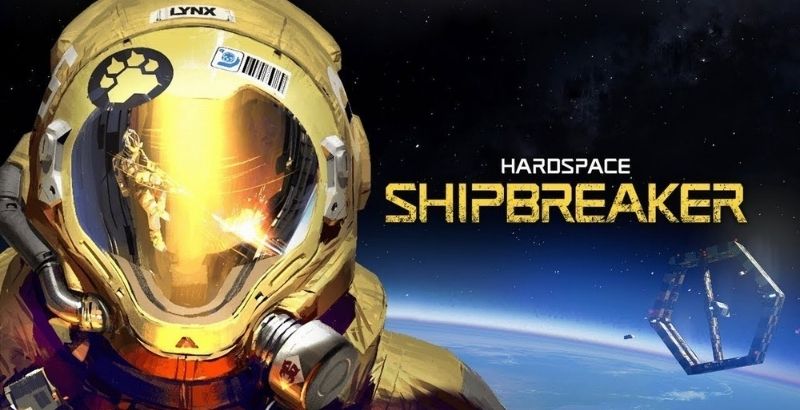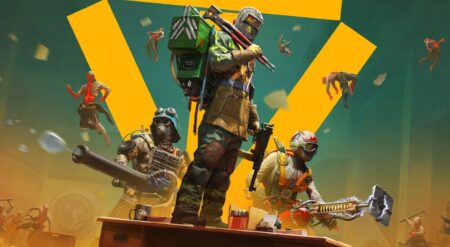
Simulation games have covered a wide range of jobs, from mowing lawns to being the clean-up crew, or being a professional power washer. Not many, though, give you an experience of a job that you may never do in your life. That’s where Hardspace: Shipbreaker steps in. Developed by Blackbird Interactive and published by Focus Home Interactive, Hardspace: Shipbreaker puts you in the stressful and backbreaking role of a Shipbreaker—a person who has to break down spaceships for all their parts. It may just sound tedious, but it’s highly dangerous too.
In Hardship Spacebreaker, you play as the rookie, the newest hire at Lynx Corporation. The game takes place in the 2300s, after unions are stripped of all rights (and made illegal in your contract), and employees have to take a loan out for just over $1 Billion to work. You’re literally in severe debt because you need a job. On top of that, Lynx forces you to enroll in the Everlife program, a proprietary program that ensures you are brought back to life in a cloned body when you die on the job. All of this leads you to start work on the backbreaking job of being a Shipbreaker.
One thing that jumps out right away is the absurdity yet the fear of the story being a potential future for us. For a simulation game, Hardspace: Shipbreaker does an excellent job of setting up the post-capitalist world and just what you’re going to experience. It literally tells you that you are going to die and that everything you do will cost you. And the great storytelling continues through your entire playtime. Told through phone calls and open comm-lines, you learn of the hardships every one of your fellow Shipbreakers is going through.
But you have to do it not only to get out of debt but because you need to think of the company. This is why I loved this story—because it told an important message: we need unions. And this message worked extremely well with the gameplay experience.
The gameplay is broken down into two parts. The first and weakest part of the game takes place in your company-provided room. You’re forced to go to this space after every 15 minutes of breaking down a ship. For an area you’re forced to go to, I never really saw its point. Yes, it is a nice little reprieve, and it’s where you upgrade your gear. But beyond that? It’s a place for the narrative that could have played out on the comms while breaking ships.
I don’t mind being forced to experience the story this way, as well as having nice breaks. However, I just wish there was more to do in this room. Beyond quickly upgrading items, all there is to do is hang posters, check emails, and build out a ship. Save for the posters, everything here takes seconds to do. I wish there were more drive to do things around this space, particularly in the post-game. It needs that je ne sais quoi to make this part feel just a little more important.
For the second part of gameplay, this is the primary focus, Shipbreaking. This part may be the most fun I’ve had in a simulator. Shipbreaking doesn’t happen in a docking bay; it occurs in the vastness of space, where no gravity will only help you. And for taking place in space, it feels like Blackbird Interactive did their homework. Floating and flying around is so much fun!
Floating in space and breaking down a ship is a fantastic combination. However, it also comes with risks. As you break down ships, you need to worry about factors like pressurized cabins, fuel, radioactive engines, electricity, etc. Thankfully, another thing Blackbird Interactive did well was introduce all of these elements over time, so it’s never overwhelming, for the most part (but more on that later).
Plus, the tools are extremely fun to use! You’re given a laser cutter, grapple, demo charges, and scanner to break these massive spaceships into pieces that can be adequately processed. Of course, it’s not just about breaking ships up into smaller, more easily manageable pieces, but into usable pieces. Notably, items that can be resold, like furniture and engines, organic materials like nanocarbon that can be processed, and other items that need to be incinerated. But nothing is more satisfying than taking a massive ship and methodically breaking it down until it’s a husk.
My favorite part of Hardspace: Shipbreaker is how the narrative and gameplay tie together so well. I mentioned before that the different elements never feel overwhelming, for the most part. There is a part where you are rushed through hazard levels with next to no training on how to handle the new elements. It didn’t feel like the developers ran out of time to add a training level; it felt like they wanted to increase my stress level.
This also plays into the tedium of the game. After a certain point, you’re not coming across new ships to break down. As a result, playing the game almost feels tedious. While this could be a negative, it works well with the story. During this section, a representative from Lynx is there to observe your team. But, naturally, it only leads to your team getting pushed too far and being worked to the bone in the name of company efficiency.

While I understand if this tedium for the sake of player empathy isn’t for everyone, I ask that you push through. Nearly every element culminates into a powerful and delightful moment at the end that will stay with me for a long while. Even after beating the game, what kept me coming back was trying to get the final ending. Trying to get there has been interesting too because getting careless has led to many, many, blown-up ships (and deaths).
Finally, I want to touch on the attention to detail. Beyond the story building its stress, the game has ways to keep it chill while also feeling stressed. For example, lo-fi tunes play in the background while you’re working. However, if you get hit in the head with an object, the radio malfunctions, and those repose tunes change to something more disruptive. Throw in the constant threat of running out of oxygen or vital supplies, and panic sets in. Most simulator games aim to be relaxing games. However, Hardspace: Shipbreaker makes you feel like you’re actually doing this stressful, heart-pounding job in just about every way.
Hardspace: Shipbreaker has cemented itself as one of my top three games of the year. It’s not without faults, like its superfluous room you’re forced to visit. However, the complete package is marvelous in the way it mixes a powerful story with some chill yet stressful gameplay. Everything feels like it went through mounds of scrutiny to make it feel like it’d fit in this world and work in space. My hat is off to every single developer who worked on this game.
Hardspace: Shipbreaker is available now on PC via Steam and Xbox Game Pass for PC.
Hardspace Shipbreaker
-
Rating - 9.5/109.5/10
TL;DR
Hardspace Shipbreaker has cemented itself as one of my top three games of the year. It’s not without faults, like its superfluous room you’re forced to visit. However, the complete package is marvelous in the way it tells a powerful story mixed with chill, yet stressful gameplay.






